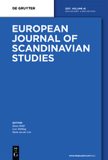
European Journal of Scandinavian Studies
Scope & Guideline
Unveiling the nuances of culture, language, and literature.
Introduction
Aims and Scopes
- Literary Studies and Criticism:
The journal covers a wide range of literary analyses, including traditional literary criticism, narrative techniques, and genre studies, with a focus on both classical and modern Scandinavian literature. - Cultural History and Identity:
It examines the cultural histories of Scandinavian societies, exploring themes of national identity, migration, and the influence of historical events on cultural production. - Interdisciplinary Approaches:
Utilizing methodologies from various disciplines such as linguistics, sociology, and cultural studies, the journal promotes interdisciplinary research that enriches the understanding of Scandinavian texts and contexts. - Folklore and Mythology:
The journal frequently engages with Scandinavian folklore and mythology, investigating their roles in contemporary literature and their impact on cultural narratives. - Language and Linguistics:
Research focusing on the evolution of Scandinavian languages, dialects, and linguistic phenomena, particularly in relation to cultural identity and literature, is a key area of interest.
Trending and Emerging
- Ecocriticism and Environmental Themes:
A growing body of work is dedicated to ecocritical perspectives, examining the relationship between literature and environmental issues, indicating an increased awareness of ecological concerns in Scandinavian narratives. - Gender Studies and Intersectionality:
There is a notable trend towards exploring gender dynamics and intersectionality within Scandinavian literature, reflecting broader societal debates on gender identity, roles, and representation. - Cultural Memory and Identity:
Recent publications emphasize the construction of cultural memory and collective identity, particularly in relation to migration and postcolonial narratives, highlighting the evolving nature of national identity. - Crime Fiction and Social Issues:
The rise of studies focusing on Scandinavian crime fiction as a lens to analyze societal issues, including citizenship, gender, and ethnicity, demonstrates the genre's relevance in contemporary discourse. - Digital Humanities and Quantitative Analysis:
An increasing interest in applying digital humanities methods, including quantitative analysis of texts, is emerging, reflecting a shift towards data-driven research in literary studies.
Declining or Waning
- Traditional Philology:
There seems to be a waning interest in traditional philological studies, as evidenced by fewer publications focusing solely on textual criticism and ancient manuscript studies. - Regional Studies Specific to Lesser-Known Areas:
Research concentrating on the cultural and literary contributions from lesser-known Scandinavian regions appears to be decreasing, potentially overshadowed by more prominent national narratives. - Historical Linguistics:
Although still present, the volume of studies dedicated exclusively to historical linguistics has diminished, with more emphasis now placed on applied linguistics and contemporary language issues. - Narrowly Defined Genre Studies:
There has been a decline in papers that focus solely on niche genres of literature, such as specific forms of poetry or drama, as broader thematic and interdisciplinary approaches take precedence.
Similar Journals
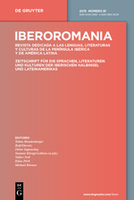
IBEROROMANIA
Unveiling Complexities in Linguistics and Literary NarrativesIBEROROMANIA, published by WALTER DE GRUYTER GMBH, stands as a pivotal journal in the fields of Linguistics and Language and Literature and Literary Theory. Since its inception in 1969, IBEROROMANIA has facilitated scholarly discourse by providing a platform for cutting-edge research that explores the complexities of Romance languages and their literatures. The journal is recognized for its valuable contributions, currently holding a Q3 quartile ranking in Linguistics and Language and a Q2 ranking in Literature and Literary Theory as of 2023. With its diverse scope spanning several years, including works from 1970 to 2024, IBEROROMANIA is pivotal for researchers, professionals, and students alike, fostering a deeper understanding of Romantic linguistic and literary frameworks. Although it does not provide open access, its impact in the Arts and Humanities is underscored by its Scopus rankings, reflecting a commitment to high-quality scholarship. For those dedicated to exploring the nuances of Romance languages and literature, IBEROROMANIA is an indispensable resource.

Dicenda-Cuadernos de Filologia Hispanica
Cultivating a Vibrant Community of Philological InquiryDicenda-Cuadernos de Filologia Hispanica, published by UNIV COMPLUTENSE MADRID, SERVICIO PUBLICACIONES, is a distinguished academic journal in the fields of linguistics, literature, and literary theory. Since its transition to Open Access in 2017, it has facilitated unrestricted dissemination of knowledge, making it an invaluable resource for researchers, scholars, and students interested in the rich tapestry of Hispanic philology. With an impact factor reflected by its Scopus rankings—at Q3 in Linguistics and Language and Q2 in Literature and Literary Theory—Dicenda serves as a vital platform for innovative research and critical discourse. The journal actively encourages submissions that explore contemporary and historical perspectives within its scope. Located in Madrid, Spain, the journal has steadily established itself as a significant contributor to the ongoing dialogue in the humanities, fostering a deeper understanding of linguistic and literary phenomena.

Cadernos de Letras da UFF
Cultivating Knowledge in Literature and LanguageCadernos de Letras da UFF is a prominent academic journal published by the Department of History at the Federal University of Fluminense in Brazil. Since its transition to Open Access in 2014, it has fostered a spirit of collaboration and dissemination in the field of Literature and Linguistics, welcoming contributions that explore various aspects of literary studies, historical literature contexts, and linguistic phenomena. With a commitment to quality and academic rigor, the journal serves as a vital resource for scholars, practitioners, and students engaged in the humanities. The journal is dedicated to the advancement of knowledge through innovative research and critical analyses, making it an essential platform for sharing ideas with a global audience. The journal is based in Niterói, RJ, Brazil, and is indexed in various academic databases, enhancing its visibility and impact within the scholarly community.

Studi Slavistici
Championing Diverse Voices in Slavic ScholarshipStudi Slavistici is an esteemed academic journal published by FIRENZE UNIV PRESS, focusing on the rich and diverse fields of Cultural Studies, Linguistics and Language, and Literature and Literary Theory. Since its initiation in 2004, it operates under an Open Access model, providing unrestricted access to its contents and fostering a wider dissemination of research. Based in Italy, this journal serves as a vital platform for scholars and researchers engaged in Slavic studies and beyond, encouraging interdisciplinary dialogue and innovative approaches. With its current Quartile rankings in the Q4 category across various domains, it plays a significant role in shaping dialogues within the academic community while offering insights into contemporary and historical perspectives. By maintaining an inclusive vision and engaging with critical issues, Studi Slavistici remains dedicated to advancing knowledge and scholarship in these intricate fields.
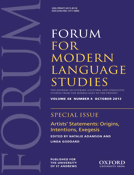
FORUM FOR MODERN LANGUAGE STUDIES
Advancing the Frontiers of Language and LiteratureFORUM FOR MODERN LANGUAGE STUDIES is a prestigious academic journal published by Oxford University Press that has been serving the fields of literature and linguistics since its inception in 1965. This journal, with an ISSN of 0015-8518 and an E-ISSN of 1471-6860, plays a crucial role in advancing scholarly discourse on modern language studies, including literature and literary theory. With an impactful presence in both the linguistic and literary domains, it has been recognized in 2023 with a category ranking of Q2 in Literature and Literary Theory and Q3 in Linguistics and Language. It stands out in the competitive landscape, holding a notable position within Scopus rankings, including a 70th percentile ranking in Literature & Literary Theory. While the journal currently does not offer open access options, it remains a vital resource for researchers, educators, and students passionate about the transformative power of language and literature. Its commitment to quality research and robust academic discussion underscores its importance, making it a key platform for those aiming to contribute to modern language scholarship.

Caplletra
Exploring the Boundaries of Language and LinguisticsCaplletra is a distinguished open-access journal dedicated to the field of linguistics and language studies, published by PUBL ABADIA MONTSERRAT since its inception. Based in Barcelona, Spain, this journal has been a vital resource for researchers, professionals, and students engaged in the intricate explorations of language and its applications since its transition to open access in 2005. Despite its current quartile ranking of Q4 within the Linguistics and Language category as of 2023, Caplletra continues to serve as an inclusive platform, fostering a dialogue that encourages a diverse range of scholarly contributions. Covering an expansive scope in the converged years from 2018 to 2024, it plays a crucial role in disseminating innovative research and insights. With its ISSN 0214-8188 and E-ISSN 2386-7159, Caplletra is committed to making academic work accessible to all, enhancing the landscape of linguistic scholarship and reflecting the evolving nature of language studies.
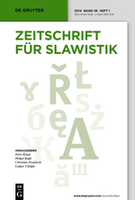
ZEITSCHRIFT FUR SLAWISTIK
Exploring the Depths of Slavic Culture and LanguageZEITSCHRIFT FUR SLAWISTIK, published by WALTER DE GRUYTER GMBH, is a renowned journal focusing on Slavic studies, encompassing various fields such as cultural studies, linguistics, and literary theory. With its ISSN 0044-3506, this distinguished journal has been a significant contribution to the academic community since its inception in 1956, continuing to disseminate valuable research until 2024. While maintaining a strong reputation within several academic categories, ZEITSCHRIFT FUR SLAWISTIK holds a Q3 ranking in Cultural Studies and Linguistics and Language, and a Q2 ranking in Literature and Literary Theory as of 2023. This positioning underscores the journal’s impact, particularly as it caters to an audience of researchers, professionals, and students invested in the rich tapestry of Slavic culture and language. Access to this journal is not open; however, its comprehensive articles are crucial for anyone aiming to explore and deepen their understanding of Slavic linguistic and literary traditions. The journal's work is essential in fostering cross-disciplinary dialogue and advancing scholarship in these vital areas.

Listy Filologicke
Unveiling Insights in History, Language, and Literary Analysis.Listy Filologicke is a distinguished academic journal published by the Institute of Classical Studies at the Academy of Sciences of the Czech Republic, focusing on the interdisciplinary fields of History, Linguistics and Language, and Literature and Literary Theory. With an ISSN of 0024-4457 and an E-ISSN of 2570-9410, this journal has been a pivotal platform for scholarly discourse since its convergence years began in 2003. Notably, it holds a Q3 classification in History and Linguistics and Language, and a Q2 in Literature and Literary Theory as of 2023. Its rankings within Scopus illustrate its relevance and impact in academia, with noteworthy positions in the Arts and Humanities and Social Sciences categories. Researchers, professionals, and students will find Listy Filologicke an invaluable resource for exploring cutting-edge research, critical analyses, and discourse that contribute significantly to their respective fields. Based in the heart of the Czech Republic, it continues to promote scholarly excellence and foster international collaboration.

SCANDINAVICA
Fostering Insightful Dialogues on Scandinavian Narratives.SCANDINAVICA, published by the University of East Anglia, is a pivotal peer-reviewed journal in the fields of Cultural Studies and Literature and Literary Theory. With an ISSN of 0036-5653, the journal offers a platform for scholars and researchers to disseminate innovative research and critical insights from 2002 through 2020 and will continue to do so until 2024. Although it is not currently an open-access journal, its commitment to extensive academic discourse is reflected in its rank, with a reputable Q4 in Cultural Studies and Q3 in Literature and Literary Theory within the 2023 category quartiles. With Scopus rankings placing it in the 2nd percentile for Literature and Literary Theory and an even more esteemed 1st percentile for Cultural Studies, SCANDINAVICA stands out as an influential resource for those engaged in the vibrant intersections of cultural narratives and literary analysis. This journal serves to elevate critical discussions and foster a deeper understanding of Scandinavian cultural and literary discourses, making it an essential read for academics, students, and anyone vested in these multidimensional fields.
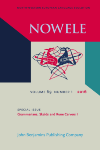
NOWELE-North-Western European Language Evolution
Charting the Course of Linguistic TransformationsNOWELE-North-Western European Language Evolution, published by John Benjamins Publishing Co, serves as a vital platform for researchers and scholars interested in the evolution and dynamics of North-Western European languages. With an ISSN of 0108-8416 and an E-ISSN of 2212-9715, this journal has been contributing to the field of linguistics since its inception in 1983, with ongoing publications until 2024. Indexed in Scopus and classified in the Q3 category for Linguistics and Language, NOWELE is recognized for its rigorous academic standards and diverse contributions, ranking #485 out of 1088 in the Arts and Humanities category, and #566 out of 1167 in Social Sciences. The journal fosters an open dialogue within the linguistic community, presenting innovative research findings and theoretical advancements. Researchers, professionals, and students alike benefit from its systematic exploration of language evolution in the context of a rapidly changing global linguistic landscape.